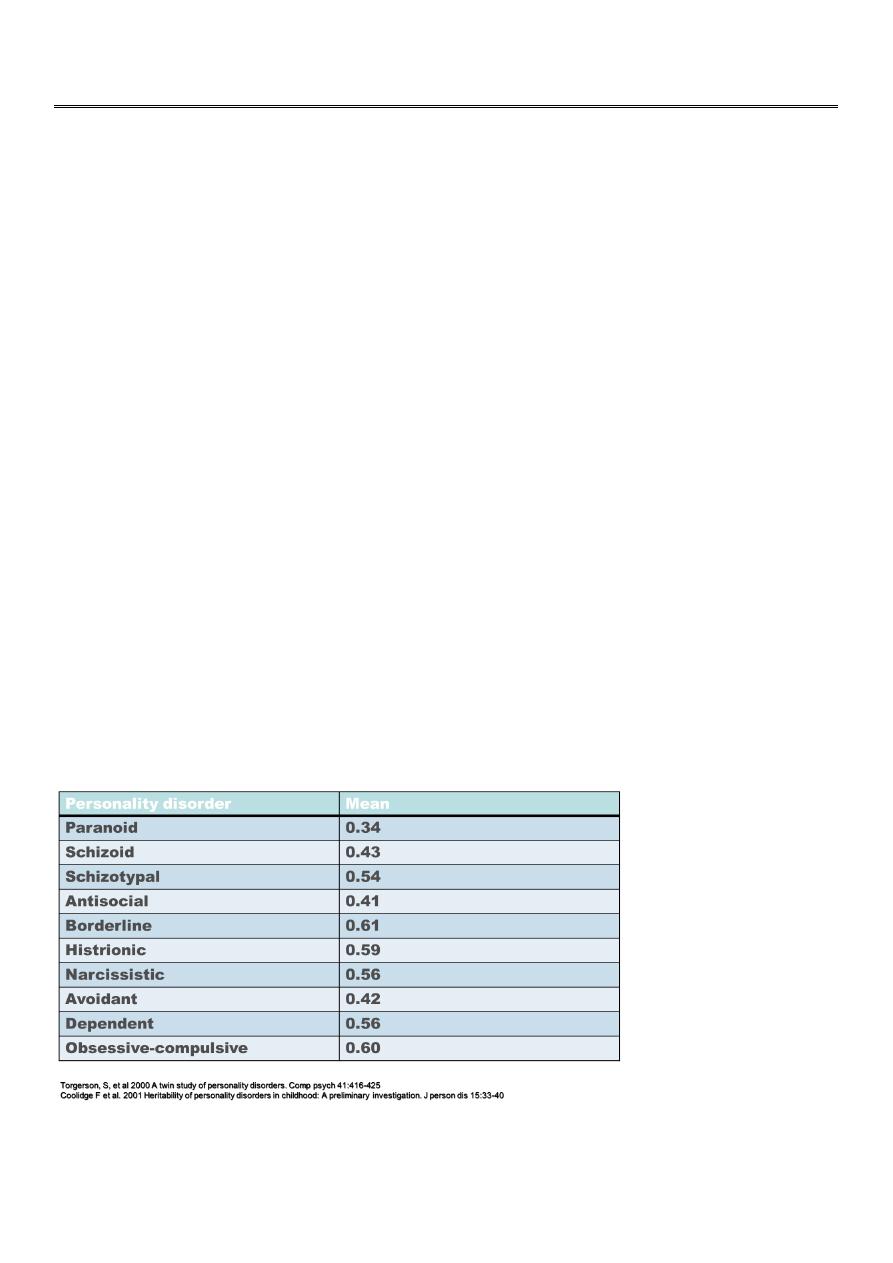
1
Fifth stage
Psychiatry
Lec-12
.د
ا
لهام
18/4/2016
Personality Disorders
Psychological disorders characterized by inflexible and enduring behavior patterns that
impair social functioning. They are common! Prevalence estimated between 6-13% of the
adult population in the United States has a personality disorder!!
Prevalence:
OCPD 2%
Paranoid 2%
Antisocial 1-4%
Schizoid 1%?
Schizotypical 1%
Avoidant
1-2%
Histrionic 2%
Borderline 2-3%
Dependent 0.5%
Narcissistic .5-1%
Heritability of personality disorders:

2
Etiology:
• Likely multi-factorial like almost all other psychiatric diagnoses.
• Genetic and environmental factors such as chaotic home environment and abuse
have been implicated in development of maladaptive behavioral patterns.
Cultural influences:
• Studies have found that in Norway compared to US, Germany and UK avoidant
personality 3-4X more prevalent, dependent personality 2-3X more prevalent and
schizoid is 2X more prevalent. Borderline is <½ as frequent and antisocial is ½ has
prevalent.
• Pattern exhibits increased internalization personality disorders are prevalent and
externalization disorders are rarer.
Paranoid Personality Disorder:
• Paranoid personality disorder is characterized by a distrust of others and a constant
suspicion that people around you have sinister motives.
• They search for hidden meanings in everything and read hostile intentions into the
actions of others.
• They are quick to challenge the loyalties of friends and loved ones and often appear
cold and distant to others. They usually shift blame to others and tend to carry long
grudges.
Antisocial Personality Disorder:
• antisocial personality disorder is characterized by a lack of conscience
• People with this disorder are prone to criminal behavior, believing that their victims
are weak and deserving of being taken advantage of. They tend to lie and steal
• they are careless with money and take action without thinking about consequences
• They are often aggressive and are much more concerned with their own needs than
the needs of others.
Borderline Personality Disorder:
• characterized by mood instability and poor self-image

3
• People with this disorder are prone to constant mood swings and bouts of anger.
• they will take their anger out on themselves, causing themselves injury
• Suicidal threats and actions are not uncommon
• They are quick to anger when their expectations are not met.
Histrionic Personality Disorder:
• constant attention seekers
• They need to be the center of attention all the time, often interrupting others in
order to dominate the conversation.
• They may dress provocatively or exaggerate illnesses in order to gain attention.
• They also tend to exaggerate friendships and relationships, believing that everyone
loves them
Narcissistic Personality Disorder:
• characterized by self-centeredness
• They exaggerate their achievements, expecting others to recognize them as being
superior
• They tend to be choosy about picking friends, since they believe that not just anyone
is worthy of being their friend.
• They are generally uninterested in the feelings of others and may take advantage of
them.
Schizoid Personality Disorder:
• People with schizoid personality disorder avoid relationships and do not show much
emotion
• They genuinely prefer to be alone and do not secretly wish for popularity.
• They tend to seek jobs that require little social contact
• Their social skills are often weak and they do not show a need for attention or
acceptance
• They are perceived as humorless and distant and often are termed "loners."

4
Schizotypal Personality Disorder:
• characterized by a need for social isolation, odd behavior and thinking, and often
unconventional beliefs such as being convinced of having extra sensory abilities.
• Some people believe that schizotypal personality disorder is a mild form of
schizophrenia.
Avoidant personality disorder:
• characterized by a pervasive pattern of social inhibition, feelings of inadequacy, and
extreme sensitivity to negative evaluation.
• consider themselves to be socially inept or personally unappealing, and avoid social
interaction for fear of being ridiculed or humiliated.
Dependent personality disorder:
• characterized by a pervasive psychological dependence on other people.
• has difficulty making everyday decisions without an excessive amount of advice and
reassurance from others
• characterized by a general psychological inflexibility, rigid conformity to rules and
procedures, perfectionism, and excessive orderliness.
• people with OCPD tend to stress perfectionism above all else, and feel anxious when
they perceive that things aren't "right".
Screening for comorbid disorders:
• Antisocial PD: Alcohol dependence and depressive disorders
• BPD: alcohol and drug dependence, mood disorders, anxiety disorders inc PTSD
• Histrionic PD: alcohol dependence, somatization disorder
• Avoidant PD: social phobia
• Any PD puts pt at higher risk than the gen population for Etoh and drug dep.
Treatment:
• No cure
